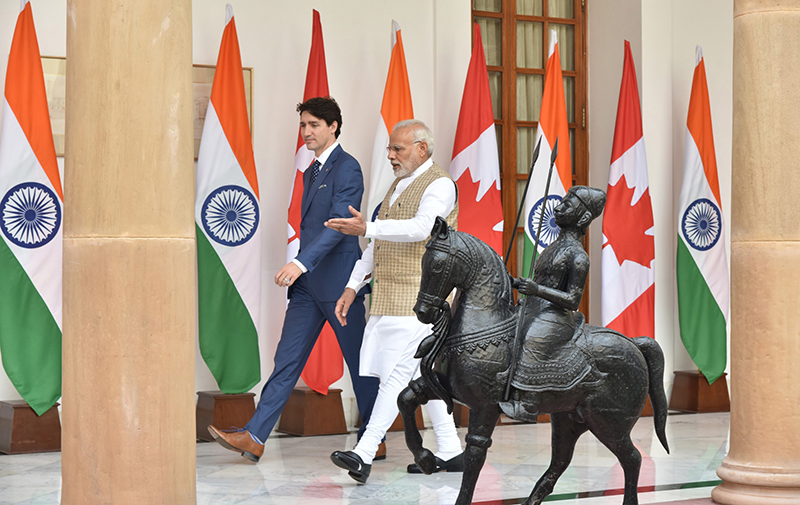Exercise utmost caution: India issues advisory for its nationals, students in Canada amid diplomatic standoff over Nijjar killing

In yet another tit-for-tat, New Delhi has issued a travel advisory for Indians who are currently in Canada, a measure taken a day after Ottawa issued a similar message for its nationals.
The developments are taking place after Canada alleged India's role in the killing of Khalistani leader Hardeep Singh Nijjar in June this year.
Cautioning nationals, the Ministry of External Affairs said in an advisory: "In view of the growing anti-India activities and politically-condoned hate crimes and criminal violence in Canada, all Indian nationals there and those contemplating travel are urged to exercise utmost caution."
"Given the deteriorating security environment in Canada, Indian students in particular are advised to exercise extreme caution and remain vigilant," the advisory said.
Amid a diplomatic standoff between New Delhi and Ottawa over the killing of Khalistani leader Hardeep Singh Nijjar, the Canadian government earlier issued a travel advisory to its citizens and asked them to 'exercise a high degree of caution' while travelling in India.
In its advisory, Canada directed its citizens: "Exercise a high degree of caution in India due to the threat of terrorist attacks throughout the country."
The Canadian government specifically asked citizens to avoid non-essential travel to north-east India, including Assam and Manipur.
The government asked its nationals to avoid travelling to Jammu and Kashmir and the border regions of India and Pakistan.
With regard to Jammu and Kashmir, the advisory said: "Avoid all travel to the Union Territory of Jammu and Kashmir due to the unpredictable security situation. There is a threat of terrorism, militancy, civil unrest and kidnapping."
However, it excluded travelling to or within the Union Territory of Ladakh.
India-Canada-Khalistan Row
Meanwhile, India has rejected the allegations made by Canada over the killing of Khalistani leader Hardeep Singh Nijjar, in an escalation of the bilateral tension between the two nations.
"Similar allegations were made by the Canadian Prime Minister to our Prime Minister and were completely rejected," read the statement issued by the MEA.
"We are a democratic polity with a strong commitment to rule of law. Such unsubstantiated allegations seek to shift the focus from Khalistani terrorists and extremists, who have been provided shelter in Canada and continue to threaten India’s sovereignty and territorial integrity. The inaction of the Canadian Government on this matter has been a long-standing and continuing concern," read the statement.
"That Canadian political figures have openly expressed sympathy for such elements remains a matter of deep concern.The space given in Canada to a range of illegal activities including murders, human trafficking and organised crime is not new.We reject any attempts to connect the Government of India to such developments," the statement said.
What did Canadian PM Trudeau allege?
Canadian Prime Minister Justin Trudeau has alleged that there are “credible allegations of a potential link” between Indian government agents and the killing of Khalistani leader Hardeep Singh Nijjar in Surrey in the British Columbia state of Canada in June.
Soon after Trudeau levelled the allegations against the Indian government in the country's Parliament, Canada’s foreign minister Mélanie Joly announced the expulsion of a “top Indian diplomat” as a consequence.
India's befitting reply
In a measure against Canada's actions, India has sacked a Canadian diplomat and asked him to leave the country within the next five days.
A statement issued by the Ministry of External Affairs reads, "The High Commissioner of Canada to India was summoned today and informed about the decision of the Government of India to expel a senior Canadian diplomat based in India. The concerned diplomat has been asked to leave India within the next five days.
"The decision reflects the Government of India’s growing concern at the interference of Canadian diplomats in our internal matters and their involvement in anti-India activities."
Who was Hardeep Singh Nijjar?
Hardeep Singh Nijjar, a Canada-based pro-Khalistan leader, was shot dead in Surrey city, British Columbia province in June.
He had been a leading figure in the Khalistan separatist movement and was closely associated with Sikhs for Justice (SFJ).
Nijjar was also serving as the president of Guru Nanak Sikh Gurdwara in Surrey.
Nijjar, a member of the Khalistan Tiger Force (KTF), was a ‘wanted terrorist’ for his involvement in various acts of violence and subversive activities.




